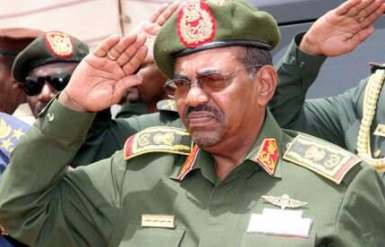S. Sudan warns of “unusual movement” of Sudanese army in border areas
April 8, 2014 (JUBA) – South Sudan said on Tuesday that it had received reports of “unusual movement” by troops from neighbouring Sudan in border areas separating the two countries, warning that such activities undermine regional stability and efforts to improve bilateral relations between the two countries

“Such aggression is a threat to the interests of not only the two countries but every country in the region,” South Sudanese army spokesperson Colonel Philip Aguer told Sudan Tribune in an exclusive interview on Tuesday.
The military spokesperson is one of the first government figures to comment on what many view as an attempt by the Sudan to take advantage of the current internal conflict in the country to redraw borders using military force.
South Sudan seceded from the north following a 2005 peace deal which ended a brutal two-decades-long civil war. It gained independence in 2011, however, much of the porous border areas separating the two countries remain undemarcated.
“There have been reports since last week from our forces about unusual movement of the Sudanese army along the border area, which is a clear evidence of [a] lack of respect and coercion and intimidation,” Unity state’s deputy governor, Stephen Mabek Lang, told Sudan Tribune in a separate interview on Tuesday.
Lang said his country would continue to respect the terms of a government agreement, but would not accept any revisions of the border line outside the previous agreement between the two countries.
“As the government we will continue to respect the terms of the agreements with the government of Sudan, especially the cooperation agreement, which was why our president visited Khartoum recently. It was to show the commitment of the government of the Republic of South Sudan,” said Lang. “But now it is appearing that someone wants to redefine the boundaries by force, which is a clear violation of territorial integrity and sovereignty of another independent state,” he added.
South Sudan’s deputy speaker of parliament, Mark Nyipuoc, said on Tuesday that his country takes seriously the treaties it has with other countries, saying the government would not tolerate “any unilateral coercive action that seeks to undermine peace and administrative control” in the country.
“It is our tradition that we implement any treaty we signed with any nation. We don’t renege. With Sudan we have implemented what was required on our side in the cooperation agreement,” he added.
The officials were reacting to reports that Sudanese warplanes struck Unity state’s Parieng county on Tuesday, dropping bombs on unknown targets.
Lang said several local sources in Pariang county witnessed Antonov bomber and MiG jets flying over Panyang area between about 9am and noon (local time).
Lang told Sudan Tribune on Tuesday that Sudanese jet fighters dropped at least 10 bombs, destroying one car and forcing civilians to flee from Panyang to Pariang.
The bombings sparked widespread fear among residents, including the estimated 70,000 refugees living at Yida camp.
The airstrike follows a visit to Khartoum by the South Sudanese president, Salva Kiir, during which security issues were discussed with his counterpart, Omer Hassan al-Bashir.
The two have agreed to cooperate on security issues, as well as implement terms of the 2012 Addis Ababa accords.
It is not clear whom the bombers were targeting, although it is known that the Sudanese rebel groups JEM and SPLM-N have both had a presence in the county.
(ST)
